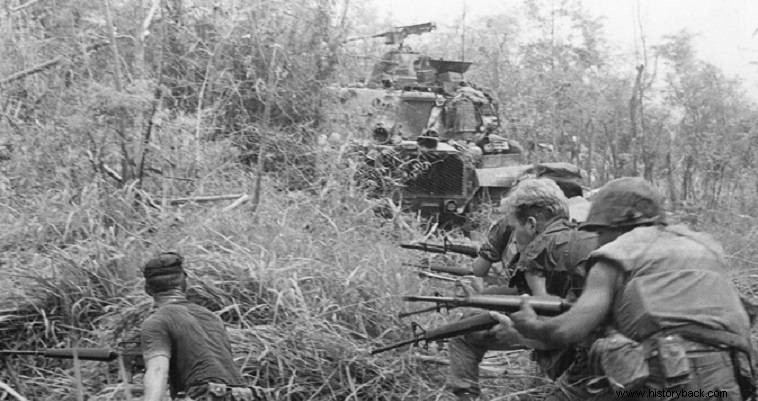
On the plain, southwest of Saigon, near the Mekong River delta, there was in 1963 a small village called Ap Bac. There was nothing extraordinary about that small village with rice fields. It was but an insignificant dot on the map, until that morning on January 2, 1963.
A few days before, the intelligence service of the South Vietnamese army informed that the village was controlled by a small force of insurgents, who had even installed a low-powered radio station there, from where they broadcast propaganda broadcasts.
The conditions were ideal for South Vietnamese President Diem to publicly demonstrate his military advances to his American mentors and the world.
Victory was predicted to be quick and easy. That's why Diem thought of using it for propaganda purposes. So he sent against the small village, which was supposed to be guarding an enemy platoon, a reinforced with artillery, tanks, a group of special forces men, a section of 51 American "advisors and heavy weapons, a regiment of motorized infantry. The operation would also be supported by an American helicopter company.
Everything looked like it was going to be a brilliant morning for Diem, who made sure to publicize the impending victory as much as possible, inviting many journalists, including Americans, to witness the operation.
Incredible development
But the god of war was definitely not on Diem's side. It all started with wrong data. The thinly guarded, supposedly, village was held by 400 experienced and determined rebels. South Vietnamese intelligence had made a mistake.
Nevertheless, even so the Southerners overwhelmingly outnumbered their opponents by a ratio of nearly 6:1, in men, to say nothing of means. However, the surprise they suffered from the beginning decided the battle.
Moving cautiously, the South Vietnamese soldiers suddenly found themselves under heavy, crossfire from the defenders. Their advance companies were decimated. Confusion and panic automatically set in throughout the hierarchy.
It is worth noting that the senior South Vietnamese officer present at the battle held the rank of captain. His superiors had remained in the safety of their offices, leaving his troops bereft. s.
The Americans asked for artillery support, but, as no firing regulation had been made, nor had sufficient ammunition been collected, the chief of the artillery support replied that he could only put up 4 shells per hour.
By all means, but…
The Americans then requested that paratroopers be dropped behind the Viet Cong lines to surround them. The throw was made, but far from where it should have been.
Finally, when they asked the commander of a motorized company to move with his armored personnel carriers towards the village, he did move, facing only rifle and machine gun fire, covering the record distance of 1,370 meters in three hours.
The Americans also threw helicopters into the fray. Five were shot down directly and another 11 were seriously damaged. Immediately afterwards they requested the bombing of the village by the air force. But by mistake the air force bombed a South Vietnamese company, sending it to flight.
The Viet Cong escaped, just after nightfall, as gentlemen, completely unmolested, taking care of their wounded as well. Their losses remain unknown. However, the other side, and due to the presence of journalists, was obliged to announce its own.
Of the South Vietnamese 65 men were killed and over 100 wounded, several of them seriously. The Americans had 3 dead and 6 wounded. 16 helicopters were also shot down or disabled. It was an unprecedented fiasco.
